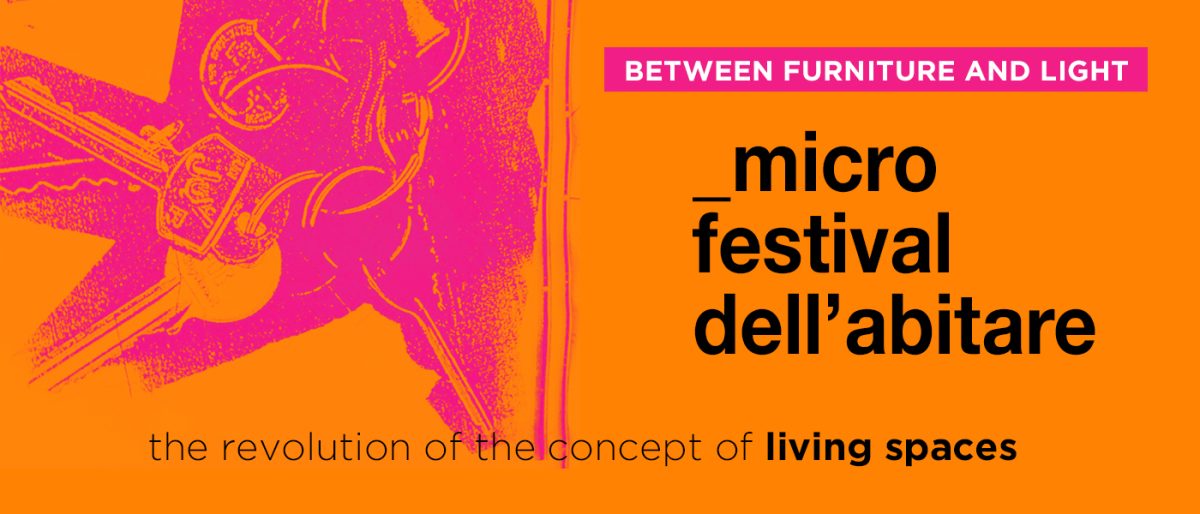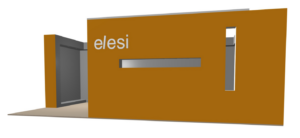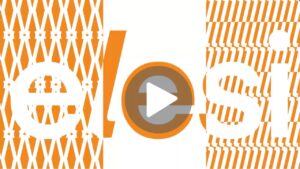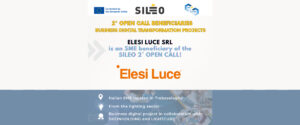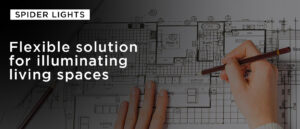Discovering the concept of inhabiting the space between furniture and light: what does the future hold for living our cities in a new way?
This is the challenge faced by the students of the Interior Design Laboratory of the Iuav University of Venice, protagonists of the main exhibition of the Microfestival dell’abitare held in Padua from 24 May to 3 June 2023.
The event has left a significant mark on the design and architecture scene. The main exhibition, titled “GuerillaLAB – Matsuri”, hosted at the Acquario space of the Altinate/San Gaetano Cultural Center, offered a compelling exploration of the potential of interiors as a tool for urban regeneration. The Microfestival wasn’t limited to just one place: it permeated the city, spreading its creative and inspiring energy in different environments.
Antonio Bressa, councilor for private construction, spoke about it in a recent interview:
“[…] we will go on site to see those areas where urban regeneration operations are underway. Certain places are reinterpreted with new functions thanks to simple operations of redefition of the interiors. In a city on which we decided not to build anymore, we have to face the theme of how to use the existing spaces and buildings changing gradually their functions on the base of the new needs. And all this thanks to urban regeneration which is the central theme of the Microfestival”
In fact, experiences and practices of remodeling spaces were presented, opening up new perspectives on the future of living in our cities.
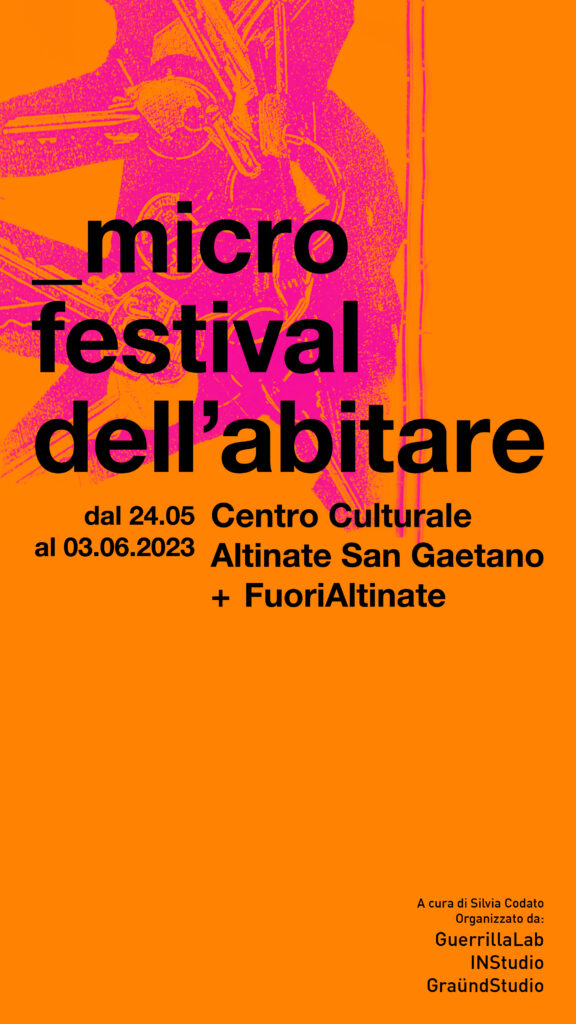
The rise of a collective project
The Microfestival dell’abitare was born out of a special evening, the 23rd of June 2022, when Padua’s studios, laboratories and workshops opened their doors to the public, showing their original and creative works. The evening, called “Acqua di San Giovanni”, was a great success and stimulated the curiosity of visitors, who were able to discover the wonders of the collaboration between architecture professionals, craftsmen and artists. A fascinating reflection arose from this experience: how interior design can contribute to urban regeneration and the quality of living. In the festival these stories were told and shared, inspiring new ways of living and coexisting in living spaces.
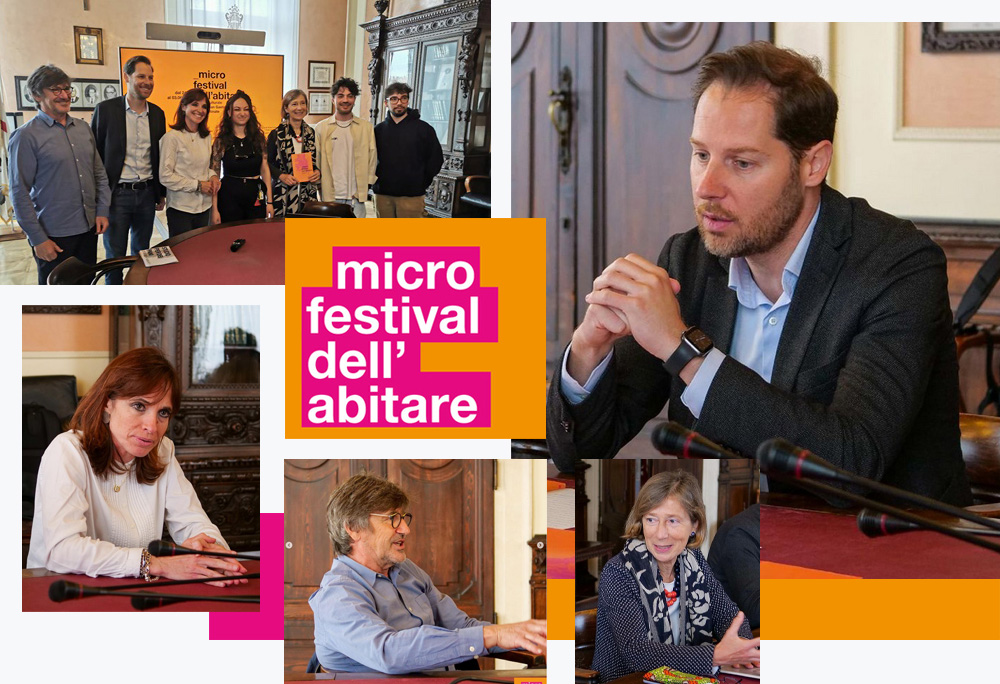
Matsuri, the Japanese festival that teaches us to live better
The exhibition underlined the celebratory dimention of the interior spaces and living, an aspect that our modern culture often forgets.
Through the microfestival we wanted to awaken awareness of the importance of relationships, creating a space where people could meet, share and celebrate together. It was a post-pandemic invitation to rediscover the beauty of human connections and to enhance the art of living to rediscover the joy of sharing spaces, ideas and emotions.
The living contexts
There were twelve innovative and surprising scenarios that offered an avant-garde vision of the concept of living, outlining a variety of housing, working and social perspectives in a post-Covid context, in which sustainability is imperative.
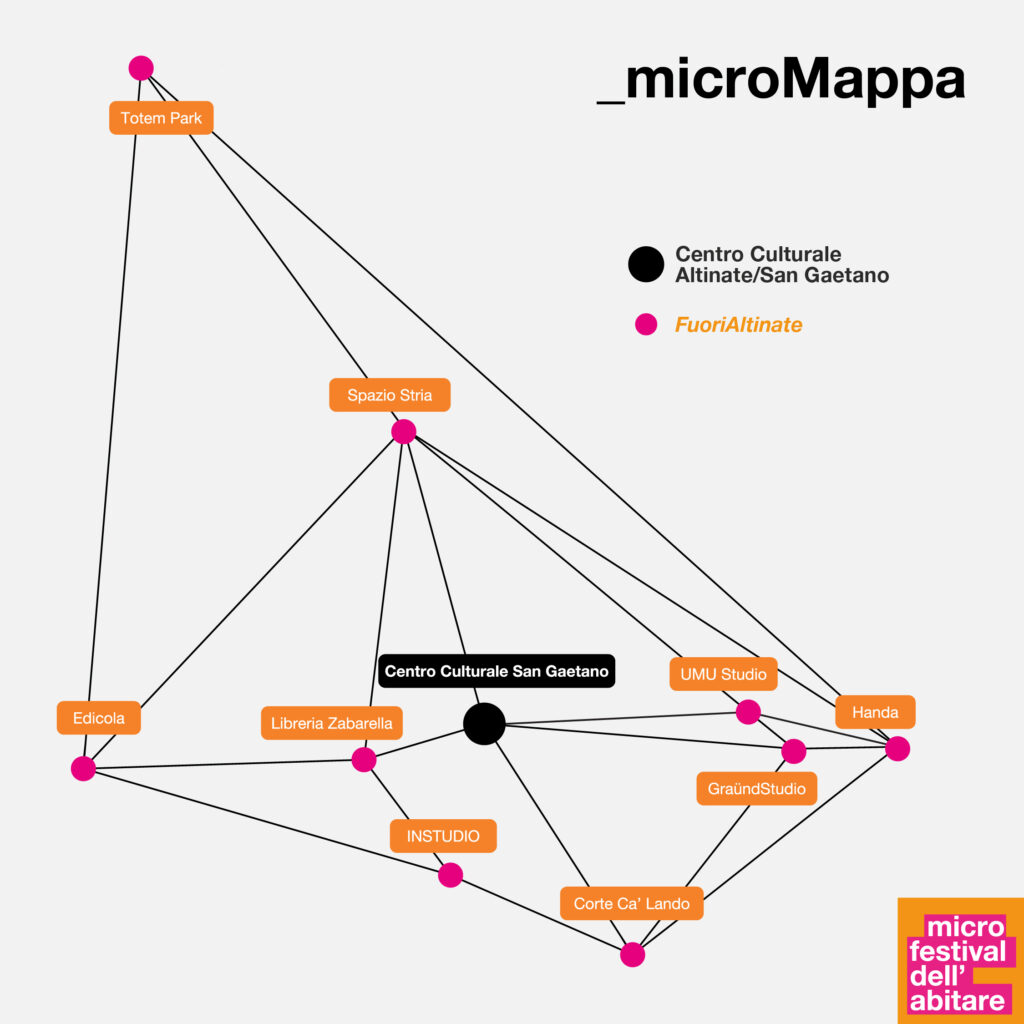
- Microhotel
new forms of hospitality with private and shared spaces. - Lab
spaces for artisans, makers and creative economies. - Student house
co-housing for students with study spaces and common living. - Microflat
new forms of housing with private and shared spaces. - Trans-age
coexistence between different generations with complementarity. - Stratifications
resolution of conflicts between different intended uses. - Urban garden
indoor farming and promotion the “zero kilometre” concept. - Garage office
spaces for working and living for creatives and professionals. - The temple
environments for meditation, ancient and modern spirituality and practices. - Artist residence
spaces for working and living for contemporary artists. - Commuter’s residence
temporary housing for commuters and travellers. - Rehab- stables
spaces for care and recovery, sharing experiences.
The regeneration of spaces
There are many subjects who have participated in the theme of the regeneration of spaces: let’s discover the protagonists of the festival and their projects together.
Guerrilla Lab
Guerrilla Lab is a bold challenge to conventions, a project that embraces the idea of reuse and reinterpretation of spaces. It’s not just a question of renovating buildings, but of giving life to an innovative urban redevelopment, reusing space in a creative and meaningful way. The authors of the concept understood the importance of imagining new uses and behaviors in space, overcoming the structural limitations and focusing on the symbolic values of the environment and on the needs of the people who inhabit it.
Graundstudio
How to re-shape the boundaries of space? This is the question that the authors of the urban redevelopment project asked themselves, which is based on the creative and significant reuse of existing spaces. Thanks to the collaboration with Graundstudio, a group of graphic designers who have made the garage their artistic home, the Microfestival dell’abitare has found an incisive and engaging visual voice. This synergy has led to the creation of a unique experience that has involved other artistic and cultural realities, such as Umu Studio, with a reading by Tiziano Scarpa on the possibilities of cohabitation, and Atelier1bis, which transformed an Asian cicchetteria into an extraordinary installation called “Living Room”.
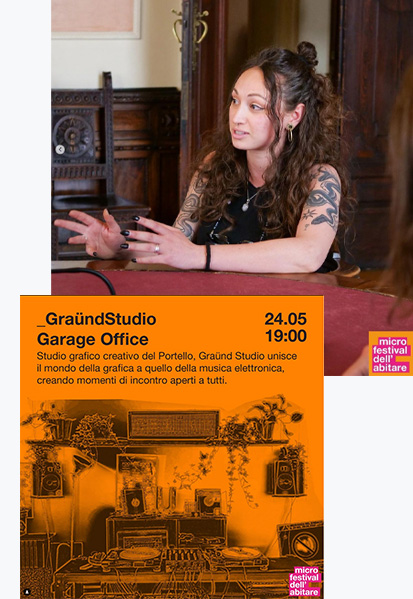
Evolution in living: exploring new horizons and materiality
The section dedicated to the interior project offered a complete overview of contemporary living, through a variety of works and talks that embraced different disciplines. Emerging artists such as Filippo Minoglio and Matteo Rattini have explored the relationship between space and materials, offering a fresh and stimulating vision. During the interventions, the theme of artistic residencies was addressed as a tool for investigation and reactivation of the territory, as well as the lack of accommodation for students and possible innovative solutions. The social practices that translate into concrete housing realities were also explored, such as the case of Spazio Stria and the winning project Creative Living Lab.
The multidisciplinary approach was further emphasized through insights into agronomy and the use of gardens as meeting and socializing spaces. The aesthetics of the spaces and the new concepts of hospitality were explored, opening the discussion on the transformation of domestic scenarios after the impact of the pandemic.
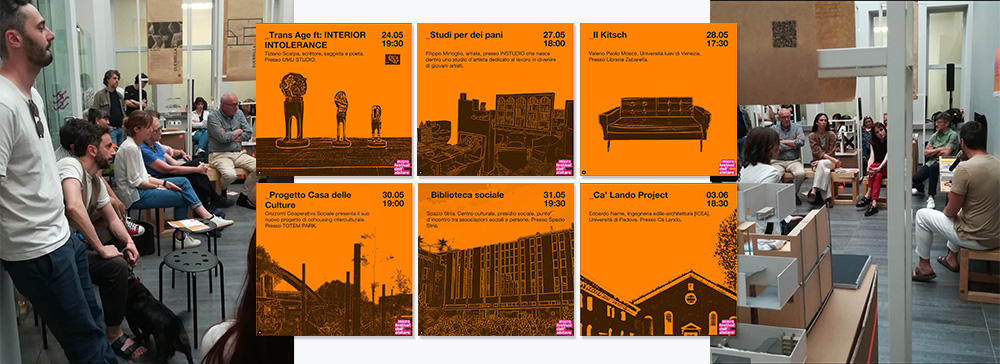
Instudio
In this context, INSTUDIO entered as a project that goes beyond traditional boundaries, uniting art, design and creativity in a single space for exploration and experimentation.
What makes INSTUDIO unique is the combination of two fundamental elements: on the one hand, the need for an intimate and reflective environment for the artist and, on the other hand, the desire to create connections and exchanges with others. The studio thus becomes a place where these two aspects merge, allowing for a harmonious coexistence between personal research and relationships with the outside world.
Its presence contributed to create an engaging and stimulating experience within the event, carrying forward the mission of spreading awareness of the new frontiers of contemporary living.
Post covid light, research and projects
One of the highlights of the festival was the closing talk held by Silvia Betteto and Alberto Sozza, respectively vice president and president of Luce In Veneto. As experts in the field of lighting they presented new devices and innovative approaches that are revolutionizing the sector. They explored new perspectives, trends and the importance of light in the contemporary living space, offering food for thought and inspiration for viewers.
Discovering the multiple dimensions of light
In the evolutionary context proposed at the event, Elesi Luce, in the person of Silvia Betteto, joined the dialogue with a theme that wanted to explore the incredible potential of light in the post-covid period. A topic that embraces the multiple facets of lighting, involving design aspects, physical phenomena and psychological impacts.
The partecipation of Elesi in Microfestival dell’abitare falls within the company’s objective of spreading the culture of light and creating awareness of its transformative role. In this time of rapid and fluid change, it is essential to understand the many dimensions of lighting and its impact on the living environment. It is important to understand that light is not only a physical parameter to be evaluated, but also an element that excites and deeply influences our lives.
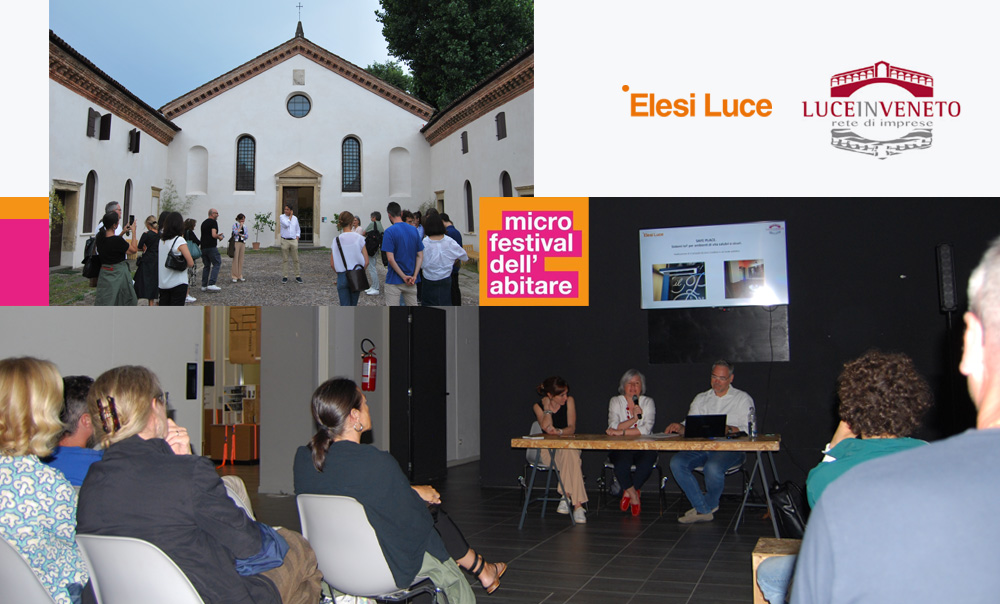
WHAT CAN A LAMP DO BESIDES LIGHTING?
In the last 15 years, light has made a real revolution, transforming itself from a simple furnishing accessory into a multifunctional element. A lamp has to lighting, but it can be also an IoT device, a design object or a unique piece of art. It can be used to sanitize environments, to incorporate sensors or it can hide sound-absorbing materials. Light has become more than just a lamp: it is a part of our daily life that enriches our living experience.
During the festival, new living spaces were experienced adapting to current needs. Dealing with living, we cannot overlook the central role of light. This event offered a unique opportunity to explore the complexity of the luminous world, exploring and making known both the technical and physical aspects, as well as those related to image and design.
Turning crisis into opportunity
The Microfestival dell’abitare was not only a cultural event, but also an opportunity for reflection and transformation. Interdisciplinary exchanges with experts, artists and researchers gave the possibility of deepen the themes of sustainability and innovation in the field of living. Participants explored new housing scenarios, creative solutions and alternative visions for the future.
The ideas of this Microfestival will continue to stimulate debate and progress in the sector, addressing the challenges and opportunities of living in our cities. This festival invites us to improve, exploring new frontiers to build a sustainable and inclusive future. As Albert Einstein said…
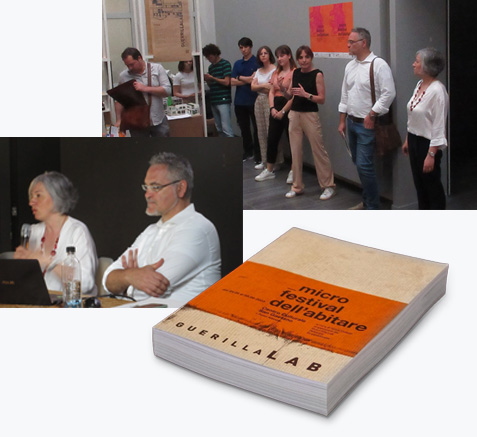
“We don’t expect things to change if we keep doing the same things. Crisis is the greatest blessing for people and nations because crisis brings progress.”




